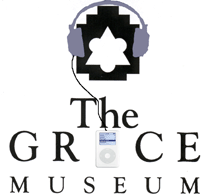 phenomenon in the fast-changing
world of the internet.
phenomenon in the fast-changing
world of the internet. Podcasting Example: The Grace Museum
In an environment that can be, at times, slow to change,
The Grace Museum has embraced
state-of-the-art podcasting technology, and set a new benchmark for art,
history and children's museums across the country. MuseCasting,
The Grace's version of podcasting, jumps on board with a relatively new
 phenomenon in the fast-changing
world of the internet.
phenomenon in the fast-changing
world of the internet.
In layman's terms, podcasting is radio broadcasting for the Web. Podcasting is somewhat different than radio in that the person has the ability to fast-forward through any content he/she doesn't want to hear. Podcasting got its name from the fact that many people download these "shows" to their iPods (an MP3 player manufactured by Apple) for listening on the go. The museum's downloading instructions for visitors are: "To download: right-click on link; save target to desktop; load on MP3 player; bring to The Grace!" (right: graphic for MuseCasting, courtesy of The Grace Museum)
Visitors to the museum have the opportunity to download to their MP3 player audio segments posted on the museum's web site prior to visiting a related exhibit. The page containing the MuseCasting section of the Museum's web site says:
The Grace Museum's podcasts are made possible by the innovative creativity of James Yasko, the Museum's Curatorial Assistant, who said that not only is The Grace the first art, history and children's museum in Texas to add podcasts to their arsenal, but as of July, 2005 The Grace was only one of three museums in the country offering podcasting. "We did some checking in our initial research, to see if there were any other museums in the country using podcasting in this way, and we were only able to find two, and neither of them have the unique combination of museums that The Grace has," said Yasko.
The Texas Association of Museums has on it's web site a telephone interview on podcasting with Mr. Yasko.
"While there are podcasts around about museums and exhibitions, we are the first museum in Texas to create our own podcasts specific to our institution," said Judy Godfrey, President and CEO of The Grace Museum. "We believe the technology and what the technology can do is a wonderful fit for us at The Grace, allowing visitors to 'sample' the sounds as well as the sights of The Grace in a new and innovative way.... Being a part of an event that makes an impact in the art world is exciting," added Godfrey. "We are always looking for ways to deepen and enrich people's understanding of our exhibitions, and this is a marvelous marriage of art and technology."
The Grace's first podcast was posted to be available until August 27, 2005, for the exhibit Fine Line: Mental Health/Mental Illness's final day. It features an interview with San Antonio photographer Michael Nye, who discusses his photography. As exhibits end, the podcasts are removed from the site and archived on alternate digital media. The staff wants to make sure that visitors are not mislead into attempting to visit art no longer on display. Online audio segments will remain of the web site, however, for topics not specific to changing exhibits. The page titled Other MuseCasts "...is the place where you can find MuseCasts that don't fit in our galleries." says the museum.
The Grace plans to add podcasts regularly to their Web site, and upcoming programs will include gallery lectures, docent-led tours of the galleries and audio "eavesdropping" on The Grace's popular Children's Museum.
For further information, call Dan Carpenter at of The Grace Museum (325) 673-4587.
1,000th podcast downloaded from The Grace Museum web site
The Grace Museum's MuseCast program surpassed a download milestone on January 13, 2006. Since its inception in June of 2005, more than 1000 MuseCasts -- the Museum's name for podcasts have been downloaded from their web site. The Grace was the first museum in Texas, and only the second museum in the country, to offer state-of-the art podcasting to its members and visitors.
"When we started MuseCasting, we were averaging two to three downloads per day," said James Yasko, the Museum's Interactive Media Coordinator. "Now, we're averaging nine or 10 per day."
MuseCasting offers interested people an opportunity to download and listen to mp3 files from the Museum's web site. The Grace's MuseCasts have included everything from interviews with artists, authors and foreign ambassadors, to audio tours of the Children's Museum.
"Putting together these podcasts has been fun and really enlightening for me," said Yasko. "It's interesting to interview the artists and other people, and learn more about our exhibits."
Go back to Online Audio
Go back to Online Educational Programming
for Institutions
Links to sources of information outside of our web site are provided only as referrals for your further consideration. Please use due diligence in judging the quality of information contained in these and all other Web sites and in employing referenced consultants or vendors. Information from linked sources may be inaccurate or out of date. Traditional Fine Arts Organization, Inc neither recommends or endorses these referenced organizations. Although Traditional Fine Art Organization, Inc. includes links to other web sites, it takes no responsibility for the content or information contained on those other sites, nor exerts any editorial or other control over those other sites. For more information on evaluating web pages see Traditional Fine Arts Organization, Inc.'s General Resources section in Online Resources for Collectors and Students of Art History.
Copyright 2006 Traditional Fine Arts Organization, Inc., an Arizona nonprofit corporation. All rights reserved.